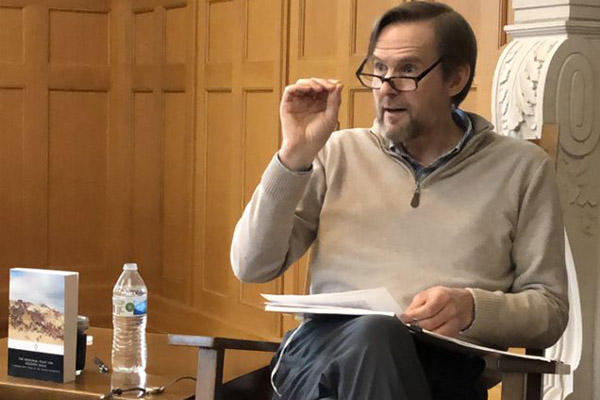Daniel Prior Visits OSU for a Reading of The Memorial Feast for Kökötöy Khan

On November 17, Dr. Daniel Prior (Miami U.) returned to Ohio State for a reading of his recently released translation of The Memorial Feast for Kökötöy Khan, a Kirghiz epic poem by Saghïmbay Orozbaq uulu. In addition to reading a passage, he shared information about the tale and his translation thereof to help the audience understand the excerpt. The Memorial Feast for Kökötöy Khan is a heroic epic poem from the Kirghiz tradition which was well-documented starting in the mid-19th century. This work is from the classical period (1925) and is unusual in that it has a named author (Saghïmbay Orozbaq uulu), though it was composed in oral performance and written down by scribes and the early Soviet folklore establishment. Saghïmbay’s poem is made up of 13,500 lines, which is more than The Odyssey, though Prior did point out that Kirghiz lines are shorter than Homeric. It is worth noting that Prior’s translation is the first time the full length of one of Saghïmbay’s epic poems has been translated into another language directly from Kirghiz.
The Memorial Feast for Kökötöy Khan is one episode within a super-narrative known as the Manas poems, which are named after the paramount hero. In this episode, all the heroes of the world come together to feast at Kökötöy Khan’s funeral and compete in games. Manas is the president of this feast. At the event, Prior read Part 14 “Manas and Qongurbay Joust; Manas Lances Qongurbay” to an engrossed audience. As the title suggests, this passage features the hero Manas and depicts one of the competitions that occurred.
Prior also offered some remarks on the translation process, explaining that it is “easier to translate literally than intelligibly”. One such example of this situation was the phrase which literally read “the hair on his body for five pairs of stockings”, which he expanded in translation to read “the hair on his body stood up bushy enough to spin yarn for five pairs of stockings”, which not only provides the reader with more information, but also helps to create vivid imagery. He noted that sometimes the implied words were vague due to the deemphasizing of finite verbs in Kirghiz which can make the syntax difficult to understand. He explained that when forced to choose between implied words and accurate syntax, he focused on making the writing understandable. This is in part why the translation is in prose rather than poetry, though he gave an example of one rhyme he was pleased to be able to preserve: boq/joq = snot/not in the line “Boqmurun the Snot-Nose, ‘It-Fazes-Me-Not'-Nose”. He also explained the research into the early Soviet auto industry necessary to translate the phrase “windy glue”, which turned out to be rubber cement or pneumatic tire glue.
Following the reading, Prior answered questions from the audience ranging in topics from the ethnicities and battle strategies portrayed in the epic, to the circulation of the text among the Kirghiz minority in China, and the use of 2nd person narration. The audience overall felt that since the story comes from an oral tradition, a live reading helped the poem to come alive.
Purchase your copy of the book here.
This event was co-sponsored by Hilandar Research Library, the Department of History, the Department of Near Eastern and South Asian Languages and Cultures, and the Institute for Chinese Studies.
